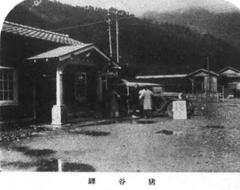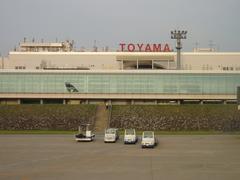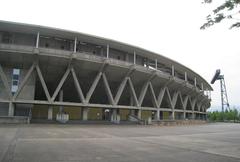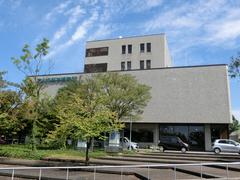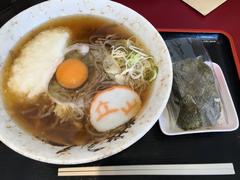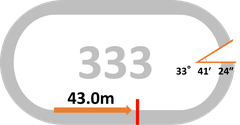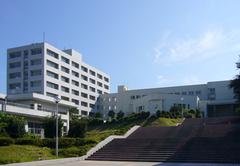
Museum of Modern Art Toyama: Visiting Hours, Tickets, and Guide to Toyama Historical Sites
Date: 04/07/2025
Introduction: History and Cultural Significance
Located in the heart of Toyama City, Japan, the Museum of Modern Art Toyama—now known as the Toyama Prefectural Museum of Art and Design (TAD)—has established itself as a pivotal institution in Japan’s postwar movement to decentralize art and culture. Originally opened in 1981, the museum’s mission was to make modern and contemporary art accessible beyond Tokyo and Osaka, enriching Toyama’s regional identity and fostering a vibrant arts community. Over four decades, its collection has grown to include works by major Japanese artists such as Shuzo Takiguchi and international icons like Joan Miró and Yayoi Kusama, bridging Japanese and global art dialogues (Wikipedia; TAD official site).
In 2017, a new era began with the opening of the Toyama Prefectural Museum of Art and Design. Designed by Hiroshi Naito, this architectural gem sits within the scenic Fugan Canal Kansui Park, offering panoramic views of the Tateyama Mountain Range. The museum’s integrated approach to art, design, and nature creates an immersive experience, complemented by dynamic exhibitions, educational programs, and innovative spaces like the Onomatopoeia Rooftop. The institution’s evolution marks Toyama’s emergence as a destination for both art lovers and curious travelers (Visit Toyama).
Table of Contents
- Introduction
- Origins and Establishment
- Development and Growth
- Architectural and Cultural Significance
- Transition to Toyama Prefectural Museum of Art and Design
- Visiting Information
- Architectural Vision and Design Philosophy
- Collections and Exhibitions
- Visitor Experience and Amenities
- Nearby Attractions
- Frequently Asked Questions (FAQ)
- Conclusion and Call to Action
- References
Origins and Establishment
The Museum of Modern Art Toyama was inaugurated in 1981 as a public institution with a dual focus: collecting significant Japanese and international modern art, and promoting art appreciation among Toyama residents. This was part of a wider trend in Japan’s prefectural governments to foster local cultural development and make art more accessible (Wikipedia).
Development and Growth
From its inception, the museum prioritized the acquisition of 20th-century Japanese works alongside key Western pieces, creating a global context for visitors. Temporary exhibitions—ranging from retrospectives of Taro Okamoto and Yayoi Kusama to explorations of movements like Abstract Expressionism and Pop Art—have drawn national attention. Educational initiatives, such as workshops and guided tours, further positioned the museum as a community hub.
Architectural and Cultural Significance
The original building was noted for its harmonious integration into the urban landscape and its flexible, visitor-friendly galleries. Culturally, the museum elevated Toyama’s status as an artistic center, supporting both established and emerging artists, and contributing to national art discourse through publications and symposia.
Transition to the Toyama Prefectural Museum of Art and Design
In 2016, the museum closed for transformation, re-emerging in 2017 as the Toyama Prefectural Museum of Art and Design (Toyama Prefectural Museum of Art and Design). The new facility expanded its mission by embracing design, reflecting the convergence of art and design in contemporary creativity. The result is a state-of-the-art institution with innovative exhibition spaces, interactive installations, and an expanded educational role.
Visiting Information
Hours
- Tuesday to Sunday: 9:30 AM – 6:00 PM (last admission 5:30 PM)
- Closed: Mondays (or the following day if Monday is a holiday), New Year holidays
Admission
- Adults: ¥500
- Seniors (65+): ¥300
- Students: ¥200
- Children under 12: Free
- Special Exhibitions: May require additional fees
Tickets
- Available at the entrance or online via the official website
Accessibility
- Fully wheelchair accessible with elevators and accessible restrooms
- Multilingual guides in Japanese and English
Guided Tours and Programs
- Regular guided tours (primarily in Japanese; some in English)
- Interactive workshops and educational events (advance registration may be required)
Getting There
- Address: 2-5-1 Shinjomachi (or 3-20 Kibamachi), Toyama City, Toyama Prefecture
- By Train: Approx. 15-minute taxi or bus ride from Toyama Station
- By Car: On-site parking available (limited spaces; public transport recommended during busy periods)
- By Bus: “Gurutto BUS” South Route connects key city locations
- Bicycle Parking: Available
Architectural Vision and Design Philosophy
Designed by Hiroshi Naito, the museum is a standout for its sensitive integration with Toyama’s landscape. Naito’s approach emphasizes:
- Site Integration: Expansive east-facing glass walls provide breathtaking views of the surrounding park and mountains, merging interior and exterior.
- Spatial Experience: Open, light-filled public areas contrast with intimate, climate-controlled galleries, inspired by the Japanese “tokonoma” alcove (TAD official site).
- Materiality: Use of Toyama timber and aluminum echoes local resources and craftsmanship.
- Sustainability: Abundant natural light and efficient orientation maximize comfort and minimize energy use.
- Iconic Features: The Onomatopoeia Rooftop for children, rooftop garden, and artful uniform designs by Issey Miyake and a logo by Kazumasa Nagai showcase the museum’s design ethos.
(Visit Toyama; Japan Travel Navitime)
Collections and Exhibitions
Permanent Collections
The museum’s holdings span painting, sculpture, graphic design, photography, and craft:
- Japanese Modern and Contemporary Art: Works by Shuzo Takiguchi and other avant-garde artists (TAD Collection).
- International Art: Pieces by Joan Miró, Shikō Munakata, and others.
- Graphic Design: Over 10,000 posters, including a major archive of Kazumasa Nagai’s works (Poster Archives).
- Design and Applied Arts: Furniture and everyday objects celebrating the interplay of art and function.
Special Collections
- Shuzo Takiguchi Collection: Manuscripts, works, and archival items.
- Simon Goldberg & Miyoko Yamane Collection: Exploring the intersection of music and visual art.
- Design Library: Books and archives for research and public use.
Rotating and Special Exhibitions
A dynamic schedule of special exhibitions draws from both the museum’s holdings and international loans:
- MINGEI: The Beauty of Everyday Things (July 13 – September 23, 2024)
- International Poster Triennial Toyama 2024 (October 12 – December 15, 2024)
- Eiko Ishioka I Design (April 19 – June 29, 2025)
- Pop Art: Four Artists Who Changed the Era (September 6 – October 26, 2025)
Educational and Interactive Programs
- Hands-on workshops (e.g., cut paper art, origami)
- Gallery talks and seminars
- Family-oriented storytelling and activity sessions
Outdoor and Special Installations
- Onomatopoeia Rooftop: Interactive space for children and families (Onomatopoeia Rooftop).
- Outdoor Sculpture Garden: Contemporary works displayed throughout the grounds.
Poster Archives
The extensive poster archive is a research and visitor highlight, chronicling four decades of graphic design evolution (Poster Archive).
Visitor Experience and Amenities
Dining
- Café (First Floor): Light meals and beverages in a relaxed atmosphere.
- Restaurant (Third Floor): Japanese and Western dishes with mountain views (skyticket.com).
Shopping
- Museum Shop: Exhibition catalogs, art books, and Toyama-inspired design products.
Family and Accessibility Features
- Kids’ room and library corner on the third floor
- Accessible restrooms and elevators
- Free Wi-Fi and lockers
Transportation and Parking
- Free on-site parking (limited to 13 vehicles)
- Public transport recommended during busy periods
Nearby Attractions
- Toyama Castle Park: Historic site and gardens
- Fugan Canal Kansui Park: Scenic walking trails and “World’s Most Beautiful Starbucks”
- Toyama Glass Art Museum: Contemporary glass art in a Kengo Kuma-designed building
Frequently Asked Questions (FAQ)
Q: What are the visiting hours?
A: 9:30 AM – 6:00 PM (closed Mondays and select holidays; last admission 5:30 PM)
Q: How much are tickets?
A: Generally ¥500 for adults; discounts for seniors, students, and children; special exhibitions may have additional fees.
Q: Is the museum accessible?
A: Yes, with elevators, ramps, and accessible restrooms.
Q: Are guided tours or workshops available?
A: Yes, check the website for schedules and registration requirements.
Q: Can I take photos inside?
A: Permitted in many areas, but restrictions may apply in special exhibitions.
Conclusion and Call to Action
The Toyama Prefectural Museum of Art and Design stands as a beacon of creativity, innovation, and accessibility—blending Japan’s modern art heritage with cutting-edge design and community engagement. The museum’s thoughtful architecture, diverse collections, and welcoming amenities make it a must-visit for anyone in Toyama. With nearby attractions and family-friendly programs, it is an ideal stop for tourists and locals alike.
Plan your visit today by checking the official museum website for the latest hours, ticketing, and events. Download the Audiala app for personalized audio guides and updates, and follow the museum on social media for news and special features. Explore Toyama’s rich cultural landscape—your journey begins at TAD!
References
- Wikipedia: Museum of Modern Art, Toyama
- Toyama Prefectural Museum of Art and Design Official Site
- Visit Toyama – Toyama Prefectural Museum of Art & Design
- Toyama Prefectural Museum of Art and Design Visitor Guide
- Museum of Modern Art Toyama Collections and Exhibitions Guide
- Poster Archives

